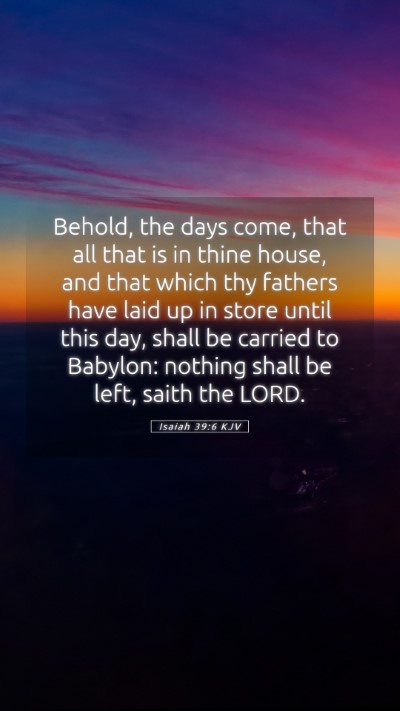Understanding Isaiah 39:6
The verse Isaiah 39:6 states:
"Behold, the days come, that all that is in thine house, and that which thy fathers have laid up in store unto this day, shall be carried to Babylon: nothing shall be left, saith the LORD."
Bible Verse Meaning
This verse serves as a dire prophecy from the Lord delivered through the prophet Isaiah. The implications are profound, suggesting impending loss and captivity that would befall Judah and Jerusalem. Here, we explore the meanings and interpretations based on commentary from established theologians.
Contextual Background
Isaiah 39 occurs during a time of relative peace for Israel, following a tumultuous period. Hezekiah, the king of Judah, has just received a miraculous healing and was visited by envoys from Babylon. The context amplifies the significance of this message—a stark contrast between present prosperity and future devastation.
Commentary Insights
-
Matthew Henry:
Henry emphasizes the certainty and inevitability of the prophecy. He interprets this as a divine warning about the consequences of pride and trust in foreign alliances rather than reliance on God. The chilling assertion "nothing shall be left" signifies total loss and serves as a reminder of accountability in leadership and governance.
-
Albert Barnes:
Barnes highlights the historical context, noting that this prophecy was fulfilled during the Babylonian Exile. He points out the sorrowful fate of Jerusalem, wherein all treasures—including those accumulated by its forefathers—would be confiscated. This serves as a foreshadowing of the spiritual and national desolation that disobedience to God brings.
-
Adam Clarke:
Clarke delves into the spiritual implications of the verse, interpreting the darkness of Babylon as symbolic of captivity to sin and worldly desire. He prompts readers to consider the loss of spiritual riches and blessings when one turns away from God. Clarke's analysis underscores a deeper, allegorical understanding of captivity: the loss of one's spiritual heritage.
Application of the Verse
Isaiah 39:6 is not merely a historical account; it extends into valuable life lessons. The verse prompts serious reflection on the priorities in life, urging individuals not to become overly attached to material wealth or societal accolades, which can ultimately be swept away.
In practical terms, it serves as a wake-up call for modern Christians to evaluate their lives and ensure they are wholly relying on God rather than earthly treasures or alliances.
Relatable Scripture References
- Jeremiah 25:11-12: This passage also discusses the fate of the land and its people due to disobedience.
- 2 Kings 20:17-18: This scripture reflects on the earlier warning of consequences to Hezekiah and his descendants.
- Lamentations 1:7: Captures the sorrow of Jerusalem and the deep sense of loss following the Babylonian conquest.
Conclusion
Isaiah 39:6 serves as a grave reminder of God's sovereignty and the transient nature of earthly possessions. Exploring this verse through the lenses of rigorous biblical commentary not only enhances our Bible verse understanding but also equips believers with vital Bible study insights applicable in navigating the complexities of faith and trust in God's plans.
Through careful Bible verse interpretation, we gain a necessary perspective on prioritizing spiritual treasures that endure rather than temporary earthly gains.


